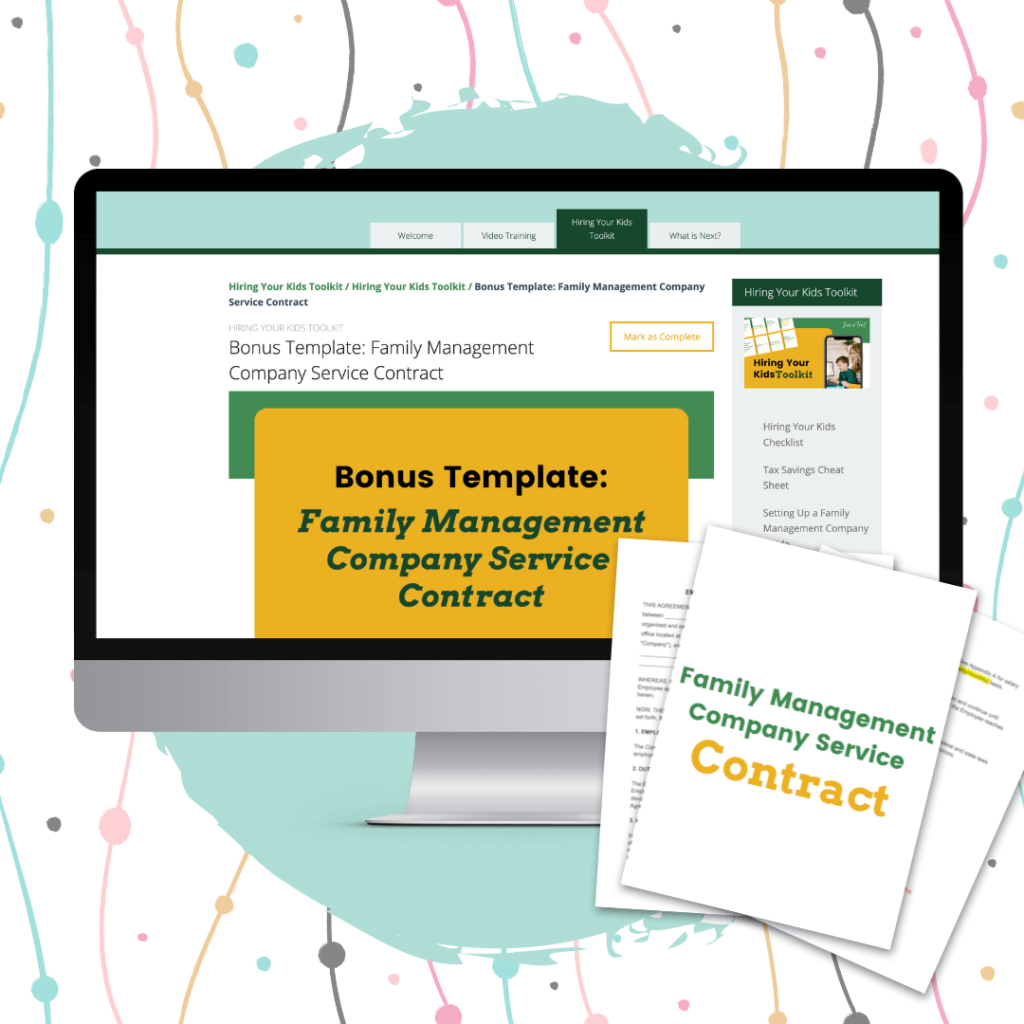
As a parent and a business owner, the idea of hiring your children can be both appealing and practical … but you might be wondering “what age do you pay taxes?”
Employing your children provides a great opportunity for them to learn business skills and earn money.
But it also offers significant tax advantages.
Did you know your kids can earn investment income… as children?
One of the immediate benefits is the ability to open a Roth IRA for them.
A Roth IRA can kickstart their savings and teach them about investing at an early age.
But, the big questions remain: What age can I employ my kids? Do they need to file a tax return?
Let’s explore the ins and outs of legally employing your children.
We’ll touching on everything from the tax benefits to the specific exemptions under the Fair Labor Standards Act (FLSA).
Federal Income Tax Benefits of Hiring Your Kids

First things first, let’s talk about the financial perks.
Hiring your children not only helps in teaching them about the value of money and hard work.
Working in the family business also provides substantial tax relief:
- Income Shifting: By paying your children a reasonable salary for legitimate work, you can shift income from your higher income tax return bracket to their lower (or non-existent) tax bracket.
- Tax Deductions: The salary you pay them is a deductible business expense. This can significantly reduce your taxable business income.
- Employment Tax Exemption: If your business is unincorporated and you hire your minor children, the wages paid are not subject to Social Security, Medicare, and Federal Unemployment Tax.
- Roth IRA Contributions: You can contribute to a Roth IRA on behalf of your child up to the lesser of their total earnings or the annual limit. This move not only helps in saving for their future but also grows tax-free.
Hiring your child is smart planning; you’re essentially investing in your family’s financial future while managing your business expenses wisely.
For detailed strategies on how to maximize these benefits, check out my free guide below.
7 Strategies to Maximize Tax Savings by Hiring Your Kids.
Legal Aspects: Hiring Under the FLSA

According to the FLSA, there is no minimum age for children to work in a non-hazardous job within a business entirely owned by their parents.
This means, technically, you can employ your child at any age if you run a parent-owned unincorporated business (meaning the exemption doesn’t apply if you have an S Corp or C Corporation). However, there are still rules to follow to ensure everything is above board:
- Non-Hazardous Jobs: These are jobs that do not involve tasks like manufacturing, mining, or any roles considered dangerous by the Department of Labor.
- Reasonable Work Conditions: While the FLSA allows flexibility, the work assigned should be safe and suitable for your child’s age and strength.
- Documentation and Records: Keep detailed records of what they do, how many hours they work, and what you pay them. This documentation is essential not only for tax purposes but also for compliance with labor laws.
Resource: For more details on the rules and regulations, visit the U.S. Department of Labor’s Youth & Labor page.
Exemptions and Limitations

Even in parent-owned businesses, some exemptions still apply, particularly concerning hazardous jobs. Here are key points to consider:
- Hazardous Occupations: Regardless of the business’s ownership structure, children under 18 are generally prohibited from working in hazardous occupations.
- State Laws: Some states have more stringent laws regarding child labor. These laws may require work permits or set stricter hour restrictions than the FLSA. It’s crucial to check the regulations in your state to avoid any legal issues.
Using a Family Management Company to Hire Your Child at a Younger Age

What Age do you start paying taxes?
If you don’t qualify for the age exemption under FLSA because your business is structured as a Corporation or you have non-parent owners of your business, you may be able to utilize a Family Management Company to get the same benefits.
This approach can provide more flexibility regarding the age at which you can employ your children.
Plus, it can reduce the taxes they are subject to.
What is a Family Management Company?
A Family Management Company is a business entity created specifically to manage the operations and various non-operational aspects of another business or a set of businesses owned by the same family.
Essentially, it acts as the central hub for the administrative, management, and possibly employment needs of the family business empire.
We know that setting up a family management company can feel complex and that is why we have an entire guide on the process of setting up a Family Management Company easily, providing a detailed step-by-step guide and explaining why this could be beneficial for your tax planning within our Hiring Your Kids Toolkit.
A Family Management Company can help you optimize your tax savings when hiring your children in an S-Corporation, C-Corporation, or a company that has multiple partners.
Curious to whether you should have an LLC or an SCorp? Check out this article >

How It Works for Employing Minors
- Establish the Company: Set up the Family Management Company as a legal entity, typically as an LLC. This entity will then be employed or contracted by your main business to manage certain aspects or provide specific services.
- Employ Your Children Within This Company: Since the management company can be structured as a sole proprietorship or a general partnership (where the partners are the parents), it falls under the type of business entities that benefit from the FLSA’s parental exemption for the employment of minors. This setup allows you to employ your children at any age, just as you would in a non-corporate family business, and avoid the FICA and FUTA taxes if managed correctly.
- Assign Appropriate Tasks: Children can be assigned work related to the family business operations managed by the company. Typical roles might include administrative assistance, social media management, and other non-hazardous jobs. The key is to ensure the tasks are suitable for their age and ability.
- Maintain Compliance and Documentation: As with any formal employment arrangement, it is crucial to maintain impeccable records of employment terms, wages, hours worked, and the nature of the work done. This documentation will help substantiate the employment relationship, ensuring it stands up to IRS scrutiny.
For parents aiming to teach their children the ropes of the family business and instill a strong work ethic early on, using a Family Management Company can be an excellent method.
This arrangement not only facilitates the legal and tax-efficient employment of minors but also sets a foundation for future entrepreneurs.
Don’t miss out on my Hiring Your Kids Toolkit, which provides detailed instructions and templates for setting up a Family Management Company and other forms of child employment in family businesses.
Practical Steps to Employing Your Minor Child

If you’re thinking about hiring your child, here are some steps to follow to ensure compliance and effectiveness:
- Determine the Role: Align the job duties with your child’s abilities. Ensure the work is meaningful and age-appropriate.
- Set Up Payroll Correctly: If applicable, set up a formal payroll system to manage wages and taxes efficiently (unless exempted under FLSA rules for parent-owned, unincorporated businesses).
- Open a Roth IRA: Once they start earning, open a Roth IRA to help them start saving and learning about investments.
- Document Everything: Maintain thorough records of hours worked, pay provided, and job duties. This paperwork will be crucial for tax purposes and labor law compliance.
To get started, check out my Kids on Payroll Masterclass Save Taxes and Set Your Kids up for Financial Success On Demand Masterclass.
Here is what you will learn about:
- Real-Life Application: I’ll share my firsthand experience on how I legally employ my young children in my business, demonstrating the benefits we’ve reaped, including tax savings.
- Reduce Your Taxes: Learn how to use your business structure—whether it’s an LLC, S-Corporation, or sole proprietorship—to hire your children (or grandchildren!) and benefit from substantial tax breaks.
- Long-Term Financial Success: Discover actionable strategies to set your kids on the path to financial independence, including how you can leverage compound interest in a Roth IRA to make them a millionaire.
Who Should Join?
> Business owners with children (or grandchildren!) under 18 seeking practical tax reduction strategies.
>> Parents or grandparents who want their children to learn financial responsibility early on.
>>> Entrepreneurs looking for legal ways to enhance their business with family values.
Register for the FREE Masterclass now!
Do you have more questions about how to file a tax return for your minor child’s income?

Employing your kids is not just a way to save on taxes—it’s an excellent opportunity to teach them about the value of money, instill a strong work ethic, and set them up for future financial success. As long as you adhere to the legal guidelines and ensure the work is appropriate and safe, this can be a beneficial arrangement for both your business and your family.
Remember, while you can hire your kids at any age in a parent-owned business, doing so responsibly is key to ensuring they have a positive work experience. Always consult with a professional to navigate the specifics of your situation, especially when dealing with tax implications and labor laws.
By setting the groundwork properly, hiring your kids can be a rewarding process that enriches your family’s business and financial understanding. Don’t forget to check out my free 7 Strategies to Maximize Tax Savings by Hiring Your Kids guide and the Hiring Your Kids Toolkit to start off on the right foot!
Happy hiring!
Other Helpful Articles About Hiring Your Kids!
Busting Myths About Hiring Your Kids
How to Start a Family Management Company
Video Transcript
Please note that the following is a direct transcript and has not been edited for errors or omissions. It is a verbatim representation of the spoken words and may include colloquial language, grammatical errors, or other inconsistencies. We have chosen to provide the transcript in its raw form to preserve the authenticity of the conversation. We recommend cross-referencing with the original audio or video source for complete accuracy.
Why Hire Your Kids?
If you’ve heard about the great tax benefits of hiring your kids, but the child labor laws have you a little bit spooked, then stick around because we’re gonna be talking about what’s actually true when it comes to the age that you can hire your kids. And you might be surprised. I am Jamie Trell CPA and profit strategist, and I love talking about the topic of hiring your kids.
Debunking Misinformation
There is so much misinformation out there. Let me tell you, this is one of those areas where people will get into knockdown, drag out fights in comments on social media about what’s true and what’s false when it relates to hiring your kids. So the first thing that I want to start off by saying is that when I talk about hiring your kids, I don’t mean doing it for exploitative purposes, right? This is not about hiring your kids for cheap labor. I’m talking about hiring them in a reasonable capacity to actually work for your business, right? And to be able to pay them. And that allows you to move income into a lower or perhaps 0% tax bracket from whatever your tax bracket is.
It also opens up a lot of amazing opportunities for your kids, such as learning about how to work in a business, learning some great skills for life later, opening conversations about finances with your kids, and also allows you the ability to open a Roth IRA for them and allow compound interest to start super early, which I cannot overstate enough how important that is.
Legal and Tax Considerations
So again, if you are watching this video, ’cause you wanna find out how to get around the child labor laws and want to employ them in your business to do dangerous things, absolutely not. That’s not what we’re talking about here. We’re also not talking about how to employ them in your business. We’re talking about really how to do this the legit and proper way so that you’re covered from a tax and legal perspective. So of course, because we are talking about tax and legal things here, I have to give the disclaimer and say that I am hashtag, not a lawyer.
Understanding the Legal Age for Hiring Your Child
So let’s talk about what age you could legally hire your child. Now, a normal age to hire a child is typically 14 based on child labor laws, okay? So typically in a regular business, any job is not gonna be able to hire your kid unless they’re 14 or older, except the FLSA, which is the Fair Labor Standards Act, actually makes exemptions for parent-owned businesses.
Exemptions and Parent-Owned Business Criteria
Now, of course, I don’t want you to just take my word for it. Here’s the actual Department of Labor website that talks about this specific exemption and the fact that children under 14 are allowed to be employed if they fall into one of these exemption categories. So there are certain things, right, like delivering newspapers that make sense working as an actor. We all know child actors exist out there, things like that. Reasonable jobs for kids that would actually make sense. And also work for a business owned entirely by your parents.
As long as you are not employed in mining, manufacturing, or any of those hazardous occupations, which I’m gonna link this down below so you can click on it. If you’re not sure if you’re in a hazardous occupation, I would imagine you would know that. But if you’re not sure, right, you can actually check out what those are. You can also check back, we’re talking right now about federal rules and that’s really important to state here.
So federally, meaning, you know, the federal rules say it is totally fine to do. However, your state could have more stringent rules, although what I found is when it comes to state rules, typically they follow this same exemption as the Federal Department of Labor. However, they may have extra things you need to do like getting a work permit or something like that for kids of a certain age. So just check with your state. Again, you can go here and you can see what those different states’ rules are just by clicking on the link.
Maximizing the Benefits
So you might be wondering what does it mean to be an entirely parent-owned business. Okay? And this is where it can get a little bit sticky. This is how you determine if this exemption applies to your business. If you are a corporation, unfortunately, this isn’t going to generally apply to you, okay? You have to be either an LLC who has not elected to be taxed as a corporation or just a sole proprietorship. Maybe it’s even just you, right? Then you would qualify under this parent exception as long as there are no other owners other than you and perhaps the other parent, right? So that’s the important thing. If you have a multi-member, let’s say LLC or a general partnership and some of those additional partners are actually not parents of the child, then this exemption does not work.
Hiring Under Special Circumstances
Okay? So this is only if the parents are solely owning either one or both are solely owning the business and the business is not a corporation. Now, does that mean you’re totally out of luck with hiring your kids if your child is under 14 and you are a corporation or you have multiple different other partners that are not parents within your business? No, there are still ways you can hire your children and you can take advantage of this exemption. It just takes a little bit more work. I have an entire video dedicated to this concept over on my channel.
Go to my video that is all about family management companies. That is essentially a workaround, but is a legal workaround if you do it correctly in order to be able to hire your kids, get the same tax benefits and be able to hire them under the age of 14 if you choose to do so. But there are a lot of things you need to keep in mind and you want to do this correctly. Now, this is definitely one of those areas that you wanna have your ducks in a row, you wanna have your documentation beautifully done to be able to support this because if you ever do get audited in the future, then that’s something that you’re gonna be glad that you have. So just make sure that you are crossing your T’s and dotting your i’s.
Practical Tips for Hiring Your Kids
Now one thing to talk about real quick before we go is the fact that even though maybe you can hire them legally in your business, if they are a minor and under the age of 14, that doesn’t mean that you can hire them for any job, right? So we talked about the hazardous job thing, but also those jobs, if they’re gonna stand up under audit, if you are ever audited, right?
You need to make sure you’re justifying not only the job that they are doing, they actually need to be working. You’re documenting it. The amount of pay that you are paying them makes sense and is reasonable. We can’t go inflating the amount we pay them just because we are wanting to get a bigger deduction and have more of a shift in income from your tax bracket to theirs. The IRS is onto that. So you need to be sure that whatever you are paying them is something that makes sense and is defensible and you wanna keep those records really, really well and really, really clean.
Using Kids in Marketing: A Practical Example
So one quick tip I’ll give you, if you’re thinking about things, especially for younger children that they could actually do in your business, modeling and acting is something that a lot of business owners pay their kids for, including myself. So my son will show up in YouTube videos with me from time to time. He really enjoys that and he gets paid for that.
My kids will both sometimes show up in various different marketing. You’ll see them, I have a whole hiring your kids toolkit, wink, wink, and they are part of the marketing for that and they get paid for that. So that is an option. If you are using them maybe already in your marketing and advertising, that’s something that you could pay them for and likely justify a higher rate than what you would have to pay them for kind of an hourly admin job.
Closing Remarks: The Win-Win of Hiring Your Kids
Now, of course, as I started with, this is not about exploitation of minors. This is about giving them important work experience, bonding opportunities with you, learning about money and how to manage it, and bonus setting them up financially for their future all while you’re getting an additional tax deduction and saving on taxes. So that sounds like a win win, win, win win and something that I am a huge, huge proponent of. So if you want more information, definitely check out the links below. Grab that free guide that I talked about, JamieTrull.com/kidtaxguide, or check out the link below and I’ll see you next time.